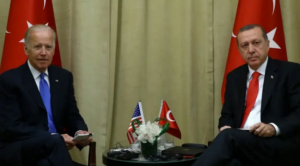The Biden administration just inked a defense cooperation agreement with one NATO ally—Greece—that is trying to bolster its military deterrence against another NATO ally: Turkey.
The renewed and expanded defense protocol the United States and Greece signed on Oct. 14 amends their previously established Mutual Defense Cooperation Agreement. Both Washington and Athens are concerned by Turkish President Recep Tayyip Erdogan’s increasingly belligerent actions, underscored by his threat Saturday—since watered down—to expel 10 Western ambassadors. For the U.S. side, the deal extends and expands U.S. military access to Greek military bases, providing Washington a hedge against Moscow and Ankara as Russian President Vladimir Putin seeks to have Turkey play a spoiler role within the NATO alliance. The Greeks, for their part, hope stronger cooperation with the United States will help them deter Turkey.
U.S. Secretary of State Antony Blinken and Greek Foreign Minister Nikos Dendias signed the defense deal in Washington following the third round of the U.S.-Greek Strategic Dialogue. The Mutual Defense Cooperation Agreement represents a new phase in U.S.-Greek security cooperation. It enables, as Blinken said, “U.S. forces in Greece to train and operate from additional locations.” That will strengthen U.S. military power projection and readiness in the Eastern Mediterranean and the Black Sea regions. Initially in effect for five years, the agreement will afterward “remain in force indefinitely” unless either government terminates it, Blinken said.
Cyprus: Committee on Missing Persons wants to search for mass graves in Varosia
Similar to Greece’s recent deal with France, the protocol strengthens Athens’s position in light of the Erdogan government’s growing gunboat diplomacy and irredentist rhetoric aimed at revoking borders fixed by the Treaty of Lausanne in 1923 following a bitter Greco-Turkish war. In all of this, Erdogan is motivated by a toxic mix of Islamist, ultranationalist, and anti-Western ideologies. Erdogan’s embrace of ultranationalist and pro-Russian factions at home for political survival in the aftermath of Turkey’s failed coup attempt in 2016 put Athens and Ankara on a collision course. The Turkish president’s abandonment of conventional Turkish foreign-policy positions and his expansionist maritime claims in the Aegean and elsewhere, developed by a number of pro-Russian officers in the Turkish military, triggered European Union sanctions in 2019 and threats of further sanctions last year.
Read more: Foreign Policy
Ask me anything
Explore related questions





